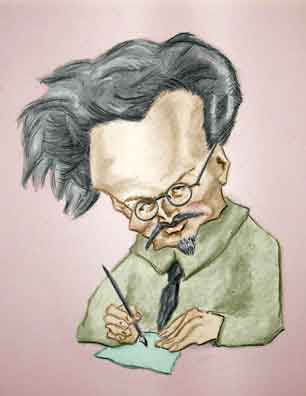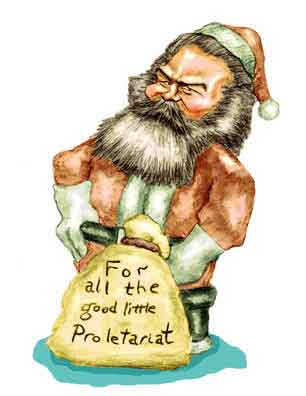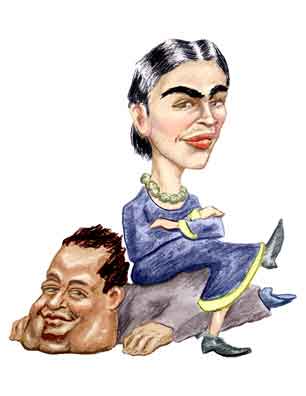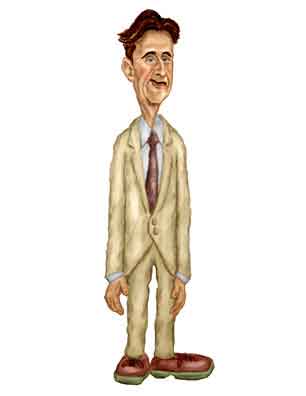
Leon Trotsky
A bankrupt leader of a bankrupt splinter group of a bankrupt ideology?

Leon Trotsky
A bankrupt leader of a bankrupt splinter group of a bankrupt ideology?
Lev Davidovich Bronstein (also transliterated Bronshtein) was born on October 26, 1879 which became November 7 after Russia finally adopted the Gregorian Calendar in 1918. His family was Jewish and moderately well-to-do. From age 8 to 16 he lived with an older cousin and attended school in Odessa. He finished high school in the town of Nikolayev which is also in the Ukraine.
People - at least in America - forget (actually most never knew) that Europe and Russia had been in political turmoil beginning in the mid-1800's. At that time much of Europe was still run by kings although many of the monarchs had their power controlled by parliaments and elections. But there were some political philosophers like Karl Marx (whoever he was) who argued against any type of monarchy and felt that governments should be controlled by the people themselves.

Karl
A Political Philosopher
By 1900, there were a lot of international conferences where people - usually but not exclusively men - got together and talked about how to create better governments. There were a large number of various ideologies and Lev ultimately joined the group called the Mensheviks. Unlike the Bolsheviks who advocated a dictatorial government run by professional revolutionaries, the Mensheviks believed in a democratic approach to change and that working and cooperating with capitalist elements was the best way to ultimately achieve a true socialistic state.
As did many of the educated liberal Russians, in the 1905 revolution (yes, 1905 - don't get ahead of the story), Lev joined the anti-monarchists (i. e., anti-Tsarist) groups and since the Tsar won, Lev ended up in prison for sedition and writing things the Tsar didn't like. In common with the more literary Revolutionaries, Lev chose a nom de guerre. So Lev became Leon and Bronstein became Trotsky. Ultimately, Leon ended up in Siberia where the Tsar liked to send the naughty boys.
The trouble is the Tsar wasn't very good at exiling revolutionaries. They lived comfortably in homes or hotels, supported by the government. They didn't have anything to do but hang around town, cavort with the local красавицы, and write more revolutionary pamphlets. Also they could get away anytime simply by taking a train to Europe.
In 1917, Lev not only took a train to Europe, but booked passage across the Atlantic to New York, where he helped edit a paper called the New World. But his time in America was brief. The same year he returned to Russia and was quickly thrown into prison - under much less pleasant circumstances than his earlier stay in Siberia. It was in prison that Leon joined the Bolsheviks now being run by Vladimir Ilyich Ulyanov, who had taken the name Lenin.
With the takeover of the Winter Palace on October 25, 1917 (à la the Julian calendar), Leon emerged as one of the leaders of the Russian Revolution. During the soon-to-follow Russian Civil War, Leon was officially in charge of the Red Army. By 1924, Leon was one of the top leaders of Russia.
But by 1924 Lenin was dead from a series of strokes, and as time went on Leon found himself in opposition to fellow Bolshevik and former divinity student Iosef Vissarionovich Dzhugashvili who fortunately for English speakers took on the more pronounceable name of Stalin. One problem was that Leon advocated a more loose form of socialism where market forces and private enterprise were to operate, which was not where Iosef was coming from. But unfortunately for Leon, Iosef also wanted to be the head cheese in Russia, Iosef was not a nice man, and ultimately Iosef won.

Frida and Diego
Leon's Friends
Eventually Leon was thrown out of the Communist Party and booted out of Russia. Starting in 1929, he began a rather convoluted series of wanderings, and in 1936, he ended up in Mexico. It was also in 1936 that Leon was tried in absentia for various crimes, including planning to kill Stalin, and he was condemned to death.
In Mexico, Leon lived with muralist Diego Rivera and Diego's pretty wife (and nice painter), Frida Kahlo. Frida and Leon hit it off quite well, particularly since Diego was hitting it quite well off with a lot of other ladies. Although Diego didn't have any reason to get holier-than-thou with either Frida or Leon, Diego's displeasure eventually was enough for Leon to seek accommodations elsewhere than chez Rivera.

George Orwell
A Trotskyite With Big Feet?
Possibly because Leon lost out, the word "Trotskyism", Leon's brand of Marxism, soon began to be spoken of with a gibe and a sneer. H. G. Wells once disparagingly referred to writer George Orwell as a "Trotskyite with big feet". One author has pointed out that this was both true and false. Yes, Orwell's feet were enormous, but he was not really a Trotskyite. In fact, George, a socialist, hated communism.
Nowadays Marxism is universally written off as a bankrupt ideology, and with Leon we have a bankrupt splinter group of a bankrupt ideology. So it's unlikely we'll see Leon's or any other brand of Marxism as the basis for any world revolution (at least not under that name). Instead the world's nations are taking on the American model of capitalism. The government is then able to reserve social expenditures - like those for government funded health care and retirement pensions - only for those who are truly incapable of gaining meaningful employment and being productive members of society. In other words, senators, representatives, and members of judiciary.
And, of course, the former and potential presidents. Most of these worthies, need we add, are so filthy rich that they could pay for their health care and retirement from the interest from investing their lobbyist funded speaking fees. But they are still eligible for the government funded benefits which can include a personal valet.
Leon died in on August 21, 1940 at aged 60. As he sat working at his desk in Mexico City, an assassin snuck up behind and drove an ice-ax into Leon's head. Leon was taken to the hospital but died the next day.
References and Further Reading
Although there are a number of biographies about Leon (including one by Leon), a good starter for Leon - and others of similar persuasions - is the For Beginners books.
Trotsky for Beginners, Tariq Ali, Phil Evans, Pantheon, 1980.
Marx for Beginners, Rius (Eduardo del Río), Pantheon, 1976.
Orwell for Beginners, David Smith, Michael Mosher, Pantheon, 1984.
Return to Leon Trotsky Caricature